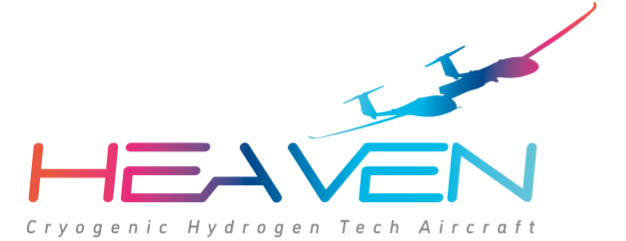CONTENTS
01. Partners’ progress concerning HEAVEN (April 2023 – September 2023) ………………………………………………. 2
02. HEAVEN Flights and press event in Maribor, Slovenia ………………………………………………………………………… 8
03. HEAVEN main results and final event ……………………………………………………………………………………………….. 9
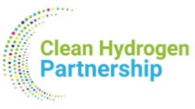
![]()
This project has received funding from the Fuel Cells and Hydrogen 2 Joint Undertaking (now Clean Hydrogen Partnership) under Grant Agreement No 826247. This Joint Undertaking receives support from the European Union’s Horizon 2020 Research and Innovation programme, Hydrogen Europe and Hydrogen Europe Research.
heaven-fch-project.eu
01. Partners’ progress concerning HEAVEN (April 2023 – September 2023)
H2FLY In December 2022, H2FLY assumes the leadership role of the HEAVEN initiative. This role builds upon H2FLY’s prior responsibilities, including direct oversight of the fuel cell system, the “HY4” integration platform, and the aircraft system architecture. With this renewed leadership, the focus is on integrating high-performance fuel cells and advanced cryogenic technology into a pre-existing aircraft framework for in-flight testing.
Key Milestones: Technical Highlights
- Liquid Hydrogen Filling Tests (April 2023): H2FLY and ALAT successfully conducted on-ground filling tests with the with the new liquid hydrogen tank which was integrated into H2FLY’s aircraft HY4. The LH2 tank was designed and supplied by Air Liquide, based on H2FLY’s requirements. This crucial phase was executed at Air Liquide’s Campus Technologies in Sassenage. These tests, focused on ensuring the integrity and efficiency of the liquid hydrogen storage system and were, foundational for the subsequent coupling tests.
- On-Ground Coupling Tests (April 2023): Following the filling tests, the first on ground coupling test started. During these tests, the liquid hydrogen storage system was coupled with the fuel cell system marking the final technological building block in the development of a complete hydrogen-electric powertrain using liquid hydrogen to power H2FLY’s HY4 aircraft. H2FLY led the test campaign on Air Liquide’s Campus Technologies Grenoble, in Sassenage, France together with Air Liquide. As part of this testing phase, the company successfully demonstrated its expertise in liquid hydrogen handling and compliance with safety regulations, especially those established by the Civil Aviation Agency (CAA) for CS-23 and CS-25 aircraft. After the coupling test phase, the HY4 aircraft was transported to Maribor Airport (Slovenia) preparing for the upcoming flight test campaign.
- Preparations for Flight Testing: In August/September, H2FLY and HEAVEN partners embarked on an intensive process to secure the Permit-to-Test flight (PTTF) from Slovenian Aviation Authorities at the Maribor airport. Upon receiving the PTTF, H2FLY was able to start flight operations with the modified HY4 aircraft aiming to successfully complete the world’s first piloted flight of an electric aircraft powered by liquid hydrogen.

Throughout the HEAVEN project H2FLY’s role has been comprehensive, spanning from providing the complete fuel cell Balance of Plant components and drivetrain system to integrating the liquid hydrogen storage and fuel cell system in the HY4 aircraft and designing the overall aircraft system architecture. Furthermore, H2FLY’s engineering team made design modifications, such as adapting the fuel cell system design to accommodate the new liquid hydrogen system’s thermal requirements, designing a buffer tank architecture, integrating a telemetry system and the developing a hydrogen evacuation system. In terms of safety, H2FLY continuously engaged in safety analyses, aligned safety requirement with the HEAVEN consortium and ensured the secure and seamless progression in every project phase.
DLR
In the last months the model control parameters in our simulation model were set for more appropriate response to changes in the stack. This was necessary, to achieve comparable results to the ones recorded with the stack on the testbench. As excitation profile we took a step profile taken from testbench measurements, looking like this:
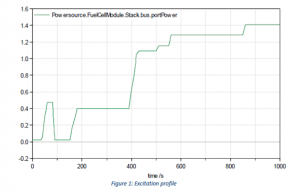
Figure 1: Excitation profile
Exemplarily for the improvement of the controls, the control of the stack temperature is described in the following. The initial response from the cooling control in the model was not converging to the set temperature since the control PID-parameter was not fitted to the dynamics of the system. Figure 2 shows the initial behaviour of the temperature controller.
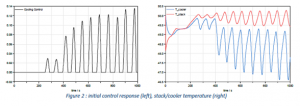
Figure 2 : initial control response (left), stack/cooler temperature (right)
The improved result, after several iterations of corrections of the control parameters, is shown in Figure 3. With the improved control parameters the stack temperature now stabilizes with only minor overshoots within short time.
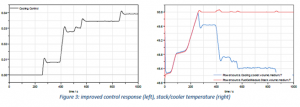
Figure 3: improved control response (left), stack/cooler temperature (right)
Similarly, all other parameters have to be fitted, giving an accurate depiction of the behaviour of the stack in real world conditions. With all control parameters adjusted, the overall system behaviour is much closer to the measured data.
FUNDACION AYESA
As part of Fundación Ayesa (FAY) contribution in HEAVEN project, it has developed an application for the collection of economic data, from each of the partner, to calculate the Total Cost Ownership (TCO). This one only can be used by the partners, and it has been managed by FAY to maintain the confidentiality of the information.
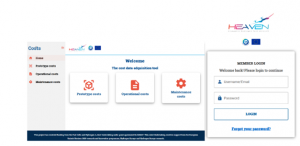
A TCO analysis has been carried out by FAY, as one of the public conclusions is that most of the costs are focused on the operational costs, it means human effort, in spite of the mass production effect.
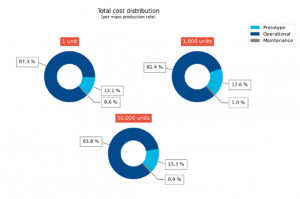
PIPISTREL VERTICAL SOLUTIONS
May 2023 was spent modifying the under-tank protection, extending it to cover the area below the valves. Additional modifications were done on the left fuselage to improve draining capabilities. This modification included designing and drilling three holes in the bottom part of the fuselage.
In June 2023, Pipistrel prototyping team modified static discharge protection for static discharge of the fuselage. PVS installed special contact elements “fingerstrips” on fuselage metal element, applied static wicks on end of both wings, on left and right vertical stabilizer and on rudder for static discharge.
Meanwhile, Pipistrel flight test team in cooperation with Air Liquid and H2FLYfinalized the test plan and obtained the aircraft permit to test in flight from the Slovenian civil aviation authority. Between August and September 2023, Pipistrel has led the flight test operations of the aircraft demonstrating the safe integration of the liquid hydrogen tank into the hybrid electric system.
The results of HEAVEN project were presented during an internal PVS dissemination event.
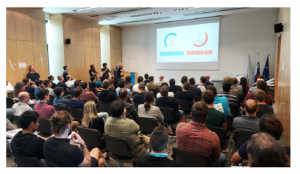
AIR LIQUIDE
In April, Air Liquide and H2FLY performed the coupling tests including filling tank operations which validated procedures and performances of the cryogenic system and its interfaces with aircraft systems including the fuel cell in order to prepare for flight test activities.

After that, the HY4 aircraft was dismounted and sent, together with ground support equipment, to Maribor Airport.
In July, all systems were installed at Maribor Airport, and Air Liquide was in charge to deliver LH2 on site. First filling tests as well as ground tests with the aircraft were performed.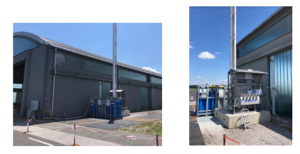
Air Liquide’s team continued to support H2FLY and PVS on site to obtain the Permit To Test Flight and to assist the partners during flight tests.
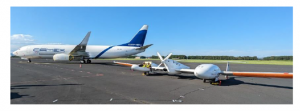
02. HEAVEN Flights and press event in Maribor, Slovenia
On 07th September 2023, H2FLY organised a press event at Maribor Airport giving international media outlets the opportunity to experience a flight demonstration live on site. In addition, the event served as premiere to publicly share information on the world’s first piloted flights with a liquid hydrogen powered electric aircraft. The news about this world’s first achievement was covered by more than 300 media outlets worldwide marking a major news moment in aviation history.
In total, the H2FLY team has completed four flights as part of its flight test campaign, including one flight that lasted for over three hours. The flights were completed with H2FLY’s piloted HY4 demonstrator aircraft, fitted with a hydrogen-electric fuel cell propulsion system and cryogenically stored liquid hydrogen that powered the aircraft.
Results of the test flights indicate that using liquid hydrogen in place of gaseous hydrogen will double the maximum range of the HY4 aircraft from 750 km to 1,500 km, marking a critical step towards the delivery of emissions-free, medium- and long-haul commercial flights. Furthermore, compared with pressurized gaseous hydrogen storage (GH2), the use of liquified, cryogenic hydrogen (LH2) enables significantly lower tank weights and volume, therefore leading to increased aircraft range and useful payload.
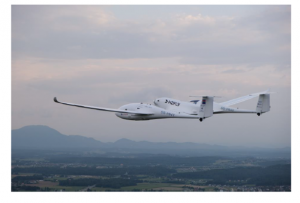
03. HEAVEN main results and final event
MAIN RESULTS:
Between January 2019 and September 2023, HEAVEN consortium had strongly worked and cooperated to successfully complete the world’s first piloted flight of liquid hydrogen powered electric aircraft. To reach this main goal, the accomplishment of this results was crucial:
- Design of the powertrain, fuel cell system, hydrogen fuel system, ground support equipment and drive train
- Manufactured of the cryogenic systems and development of the ground support equipment
- Test and validation of the cryogenic system functionality
- LH2 tanking verification
- Integration of the powertrain into the aircraft
- Coupling and testing of the fuel cell system, hydrogen fuel system and battery systems.
Each of these progresses, were possible after the excellent complementary and cooperatively work done by HEAVEN project partners.
With the successful LH2-flight, the new era of sustainable flying has started.
FINAL EVENT:
The final project results from HEAVEN will be presented during the EU Hydrogen Week 2023 from 20th to 24th of November 2023.The project will have an assigned stand at the EU project Pavilion. Visitors will have the opportunity to get information on the project results and talk to experts from the HEAVEN consortium. As part of the event a project presentation will be held d on Wednesday, 22nd of November 2023.
Experience HEAVEN and join us at our stand the EU Hydrogen Week 2023. You can register free of charge here: https://eu.eventscloud.com/ereg/newreg.php?eventid=200260430&categoryid=201926489&t=636ff21a94fad6ffad8cb754aa5e3311
